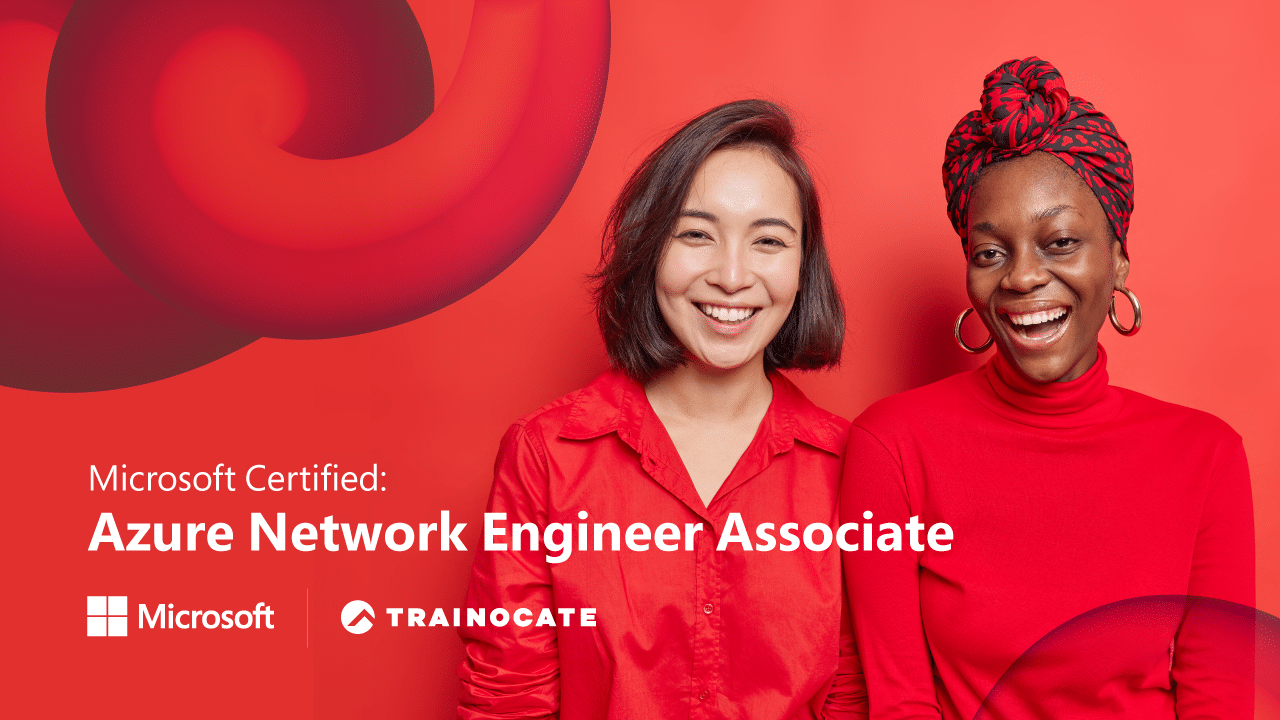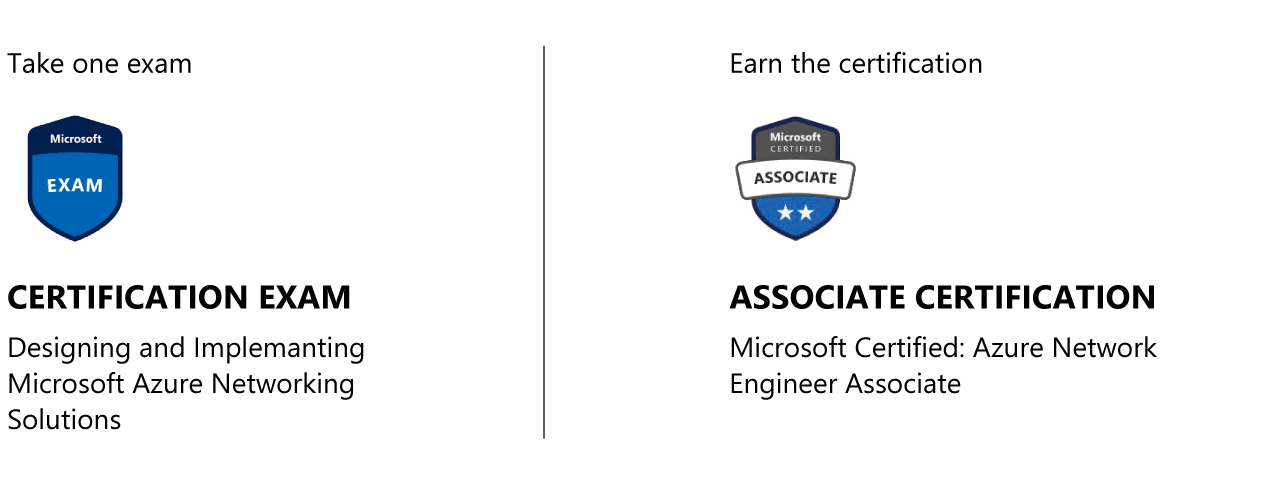Microsoft Certified: Azure Network Engineer Associate
Microsoft Certified: Azure Network Engineer Associate
With a robust infrastructure that spans 60+ regions, 170+ PoPs worldwide and 165,000 miles of private fibre — Azure offers unparalleled performance & scale to meet any workload requirement. High availability & enterprise-grade security promise maximum reliability for your mission-critical projects.
Microsoft Azure is revolutionizing the global business landscape by connecting companies to an ever-growing number of services in the cloud. Network engineers are now at crossroads, helping organizations embrace a new era through migrating workloads and driving hybrid connectivity – from providing flexible resources to managing remote workforces. These professionals can make or break successful digital transformation initiatives with their strategic knowledge.
What is a Network Engineer?
As a Network Engineer, you’re no stranger to physical assets like routers and firewalls. You have even used routing protocols such as RIP, OSPF and BGP while leveraging CLI or management tools for configuration – these skills are now ready to take your network into the cloud realm! Get up-to-speed on Azure networking by getting an understanding of its basic tenants. Be prepared to work with some different techniques including Azure Resource Manager API, CLI & Powershell plus much more when managing assets in the cloud.
Before you start your network journey in the cloud, let’s gain some basic understanding of the basic tenants of Azure networking.
The virtual network
When designing a network, it’s important to take into consideration all the required components for successful implementation. This starts with collecting information such as the number of hosts and devices, subnets needed, routing plans between those networks and optionally isolation domains like VLANs. The gathered data helps optimize resources by sizing elements appropriately while creating an architecture that will support applications effectively in Azure or any other environment you choose to use.
Virtual networking is key when using cloud services; instead of physical gear there are logical entities which need planning just like before – IP addresses & subnetting along with proper routing protocols plus policies should be addressed beforehand so your project can run smoothly upon deployment.
What makes Azure’s Virtual Network so special?
Azure virtual network gives your Azure resources the power to securely communicate with each other, on-premises networks and even the internet. Take advantage of powerful scenarios such as communicating between multiple cloud services, filtering tedious traffic while routing others efficiently, or linking existing IT infrastructures with new applications – all from a single platform.
All you need to know about the Azure Network Engineer certification
Azure network engineers join hands with a diverse team of tech professionals including Azure administrators to unlock the potential of Azure cloud solutions. By combining their combined expertise in solution architecture, system administration, security engineering, app development and DevOps processes – they’re able to bring cutting-edge technologies into play for maximum effect.
If you want to prove your expertise and expand your career opportunities when it comes to customizing Azure networking solutions, including hybrid network set-ups with secure connections between private networks and public accesses of Azure services – get the Microsoft Certified: Azure Network Engineer Associate certification today!
What kind of knowledge and experience should you have?
Azure Network Engineers are the keys to a successful cloud infrastructure. To make sure your network is secure, efficient and well-maintained you need an experienced engineer with expertise in enterprise networking, on-premises or cloud environments, as well as network security.
- Understanding of on-premises virtualization technologies, including VMs, virtual networking, and virtual hard disks.
- Understanding of network configurations, including TCP/IP, Domain Name System (DNS), virtual private networks (VPNs), firewalls, and encryption technologies.
- Understanding of software-defined networking.
- Understanding hybrid network connectivity methods, such as VPN.
- Understanding resilience and disaster recovery, including high availability and restoration operations.
Skills Covered
- Design, implement and manage hybrid network connections
- Design and implement core Azure networking infrastructure
- Design and implement routing and load balancing in Azure
- Secure and monitor networks
- Design and implement private access to Azure Services
How can you get ready?
Microsoft Azure is revolutionizing the way organizations around the world are working, providing new benefits for customers as they move their workloads and operations to the cloud. Network engineers have taken on increasingly complex tasks; from hybrid connectivity management to enabling secure remote access that allows digital transformation in numerous shapes and forms. The critical role of network engineering continues to advance and evolve within this expanded landscape.
Most Popular Questions About Azure Certifications
1) Are Microsoft Azure certifications worth it?
Azure certifications offer IT, professionals, an edge in this cloud-based and connected world. Job seekers and seasoned professionals alike can use Azure certifications to help advance their career—in their existing organization and role or in new ones—earn recognition, and validate their technical knowledge and abilities in current and future industry job roles and organizations can use certifications to identify the talent they need and build the technical skills of their workforce
2) How do Microsoft Azure certifications benefit me?
Azure certifications are globally recognized and industry-endorsed. They’re used both by job seekers (individuals) and by talent seekers (organizations) as a way to validate that a candidate has the skills to do the job. They’re a powerful differentiator in the quest to match skilled talent to key jobs in the digital age.
Whether you’re looking to level up your career or to jump-start a new one, you can use Azure certifications to build and validate your technical knowledge and abilities in the modern cloud environment. In these unsettling times, earning your Microsoft Certification can help provide you with the edge you need with organizations that are seeking skilled talent.
3) Why are Microsoft Azure certifications so important in today’s landscape?
Azure is the most widely used cloud computing platform, leading the cloud industry forward globally. A large majority of organizations and enterprises – small and big, have made the leap towards embracing cloud technology. This paradigm shift has also revealed that organizations want to remain competitive as the demand for cloud-based and centred solutions grows daily, directly affecting the need for technology professionals with cloud knowledge.
Microsoft has been at forefront of ensuring that the global workforce is prepared to take on this substantial task by validating and certifying top applicants who are the best suited for a specific job position, according to Microsoft. Microsoft certifications can undoubtedly add value to a candidate’s professional journey as most businesses now prefer to have prospective employees with certifications in tow.
4) What are the available levels of Azure credentials?
There are four levels of Microsoft certifications Azure Certification path levels, covering beginner to expert level azure cloud certification.
- Fundamentals – If you are a beginner, your Azure journey will start with Azure Fundamentals certification. Candidates with a non-technical backdrop can also step into cloud computing through these certifications.
- Associate – Candidates who have a fair idea of Azure can aim toward associate certifications.
- Expert – You can obtain an expert certification if you have experience, a solid comprehension of the subject, and associate-level familiarity with Azure.
- Specialty – It is the highest level of Azure certification. Candidates can opt for this Azure certification if they want to apply for roles like Azure IOT Developer Specialty and Azure for SAP Workloads.
5) Will Azure work for my industry?
Azure provides solutions for all industries, through proven combinations of cloud products and services. Address your industry-specific business challenges today, and prepare for the future by innovating with Azure solutions.
6) How does Azure compare to other clouds?
Azure is the only consistent hybrid cloud, that delivers unparalleled developer productivity, provides comprehensive, multilayered security, including the largest compliance coverage of any cloud provider, and you’ll pay less for Azure as AWS is five times more expensive than Azure for Windows Server and SQL Server.
7) What is the role of an Azure Network Engineer?
Responsibilities for this role include recommending, planning, and implementing Azure networking solutions. Professionals in this role manage the solutions for performance, resiliency, scale, and security. They deploy networking solutions by using the Azure Portal and other methods, including PowerShell, Azure Command-Line Interface (CLI), and Azure Resource Manager templates (ARM templates).
The Azure network engineer works with solution architects, cloud administrators, security engineers, application developers, and DevOps engineers to deliver Azure solutions.
8) What is covered in the AZ-700 certification exam?
Candidates for this exam should have subject matter expertise in planning, implementing, and maintaining Azure networking solutions, including hybrid networking, connectivity, routing, security, and private access to Azure services.
This exam measures your ability to accomplish the following technical tasks: design, implement, and manage hybrid networking; design and implement core networking infrastructure; design and implement routing; secure and monitor networks; and design and implement private access to Azure Services.
Set your sights on the future with Azure.
Are you eager to show the world that your Azure networking skills and experience are top-notch? Now is the time – to get started with learning about how obtaining an Azure Network Engineer Associate certification can take your career to greater heights. Don’t hesitate, start today.









